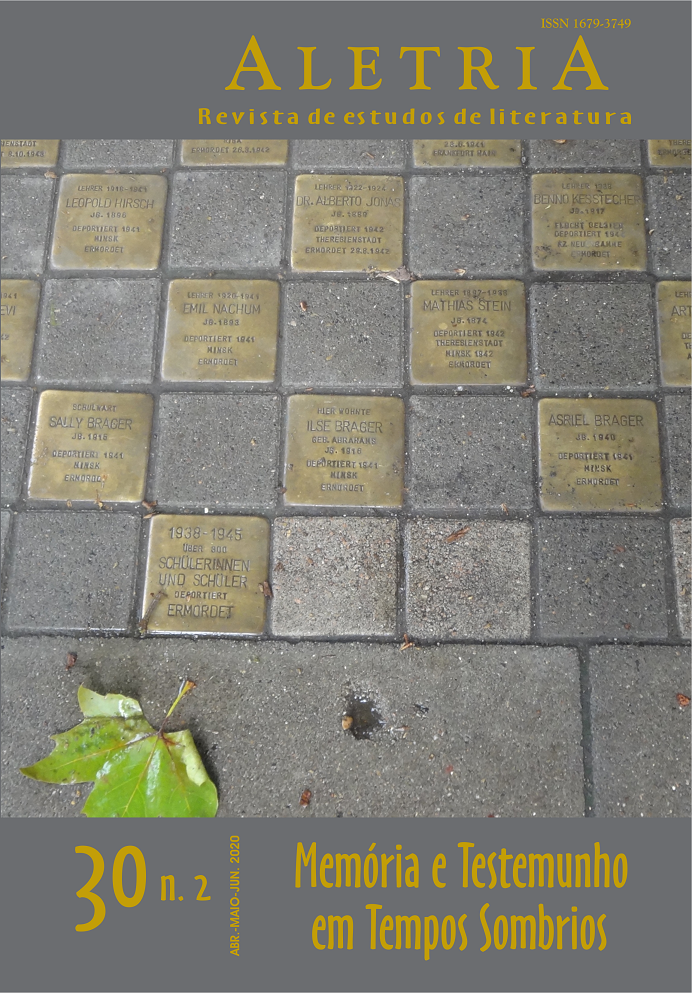Hijacked by History
The Merchant of Venice, George Tabori and the Memory of the Holocaust
DOI :
https://doi.org/10.35699/2317-2096.2020.21947Mots-clés :
Shakespeare, The Merchant of Venice, memory, Holocaust, George TaboriRésumé
This article considers Shakespeare’s The Merchant of Venice as a work singularly transformed by the events of the Holocaust, in such a way that stagings of the play are often turned into pretexts for remembrance. It discusses the play as an archive of trauma, and reflects on whether it may provide testimony for the atrocities committed during the war. To this end, the article provides an inquiry into different perspectives of trauma and its representation, relying on Giorgio Agamben’s explorations of the aporia of bearing testimony, and on Shoshana Felman’s notion of testimony as a performative speech act. Finally, this work looks at three different adaptations of Shakespeare’s play in the second half of the 20th century by George Tabori (1914-2007), a Jewish Hungarian playwright and director.
Téléchargements
Références
AGAMBEN, Giorgio. O que resta de Auschwitz. Tradução de Selvino J. Assmann. São Paulo: Boitempo, 2011.
AGAMBEN, Giorgio. Remnants of Auschwitz. Translated by Daniel Helle-Roazen. New York: Zone Books, 1999.
ASSMANN, Aleida. Espaços da recordação: Formas e transformações da memória cultural. Campinas: Editora da Unicamp, 2011.
BERRY, Ralph. The Merchant of Venice. In: OCCHIOGROSSO, Frank (ed.). Shakespeare in Performance: A Collection of Essays. Newark: University of Delaware Press, 2003. p. 46-57.
COLE, Tim. Selling the Holocaust from Auschwitz to Schindler: How History is Bought, Pachaged and Sold. New York: Routledge, 2000.
DIEDRICH, Antje. “The Grey and the Coloured Truth”: Memory and Post-Memory in George Tabori’s Plays. Journal of Literature and Trauma Studies, Lincoln, v. 3, n. 1, p. 1-21, 2014. DOI: https://doi.org/10.1353/jlt.2014.0017. Available at: https://muse.jhu.edu/article/581055. Date of access: 10 Sept. 2018.
FEINBERG, Anat. Embodied Memory: The Theatre of George Tabori. Iowa City: University of Iowa Press, 1999.
FELMAN, Shoshana. Testimony: Crises of Witnessing in Literature, Psychoanalysis, and History. New York/London: Routledge, 1992.
HOROWITZ, Arthur. Shylock after Auschwitz: The Merchant of Venice on the Post Holocaust Stage – Subversion, Confrontation and Provocation. Journal for Cultural and Religious Theory, Denver, v. 8, n. 3, p. 7-19, 2007.
KENNEDY, Dennis. Looking at Shakespeare. Cambridge: Cambridge University Press, 1993.
RIEFF, David. The United States Museum of Holocaust Kitsch. Foreign Policy, Washington, DC, 14 abr. 2016. Available at: http://foreignpolicy.com/2016/04/14/the-united-states-museum-of-holocaust-kitsch/. Date of access: 10 Feb. 2018.
SCHÜLTING, Sabine. Evoking the Holocaust in George Tabori’s Productions of The Merchant of Venice. In: SHAPIRO, Michael; NAHSHON, Edna (ed.). Wrestling With Shylock: Jewish Responses to The Merchant of Venice. Cambridge: Cambridge University Press, 2017. p. 224-242. DOI: https://doi.org/10.1017/9780511845789.011.
SELLIGMANN-SILVA, Márcio. O local da diferença: Ensaios sobre memória, arte, literatura e tradução. São Paulo: Editora 34, 2005.
SHAKED, Gershon. The play: gateway to cultural dialogue. In: SCOLNICOV, Hanna; HOLLAND, Peter Holland (ed.). The Play out of Context: Transferring Plays from Culture to Culture. Cambridge: Cambridge University Press, 1989. p. 7-21.
SHAKESPEARE, William. A Midsummer Night’s Dream. Edited by Madeleine Doran. In: HARBAGE, Alfred (ed.). The Complete Pelican Shakespeare. New York: Viking Penguin, 1977. p. 146-174.
SHAKESPEARE, William. Romeo and Juliet. Edited by John Hankins. In: HARBAGE, Alfred (ed.). The Complete Pelican Shakespeare. New York: Viking Penguin, 1977. p. 823-854.
SHAKESPEARE, William. The Merchant of Venice. Edited by John Drakakis. London: Arden Shakespeare, 2010. (The Arden Shakespeare. Third Series).
SHAPIRO, James. Shylock the Jew on Stage: Past and Present. Shofar, v. 4, n. 2, p. 1-11, 1986. Available at: http://www.jstor.org/stable/42940755. Date of access: 2 May 2020.
SILVERSTONE, Catherine. Shakespeare, Trauma and Contemporary Performance. New York: Routledge, 2011. DOI: https://doi.org/10.4324/9780203862940.
WORTHEN, W. B. Disciplines of the Text: Sites of Performance. In: BIAL, Henry (ed.). The Performance Studies Reader. London/New York: Routledge, 2004. p. 10-25.
Téléchargements
Publiée
Numéro
Rubrique
Licence
(c) Copyright Maria Clara Versiani Galery (Autor) 2020

Ce travail est disponible sous la licence Creative Commons Attribution 4.0 International .
Authors who publish with this journal agree to the following terms:Authors retain copyright and grant the journal right of first publication with the work simultaneously licensed under a Creative Commons Attribution Non-Commercial No Derivatives License that allows others to share the work with an acknowledgement of the work's authorship and initial publication in this journal.Authors are able to enter into separate, additional contractual arrangements for the non-exclusive distribution of the journal's published version of the work (e.g., post it to an institutional repository or publish it in a book), with an acknowledgement of its initial publication in this journal.Authors are permitted and encouraged to post their work online (e.g., in institutional repositories or on their website) prior to and during the submission process, as it can lead to productive exchanges, as well as earlier and greater citation of published work (See The Effect of Open Access).









